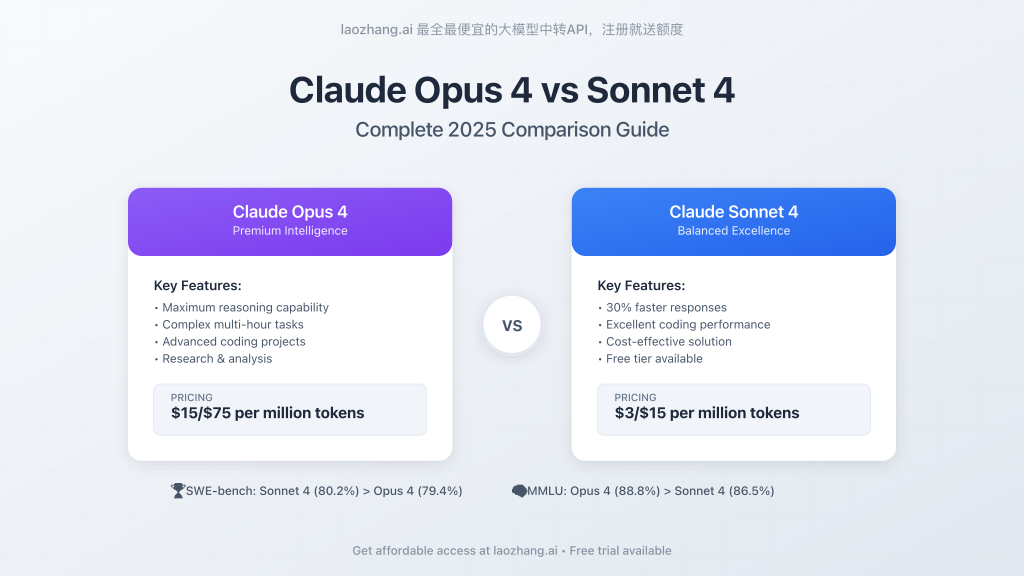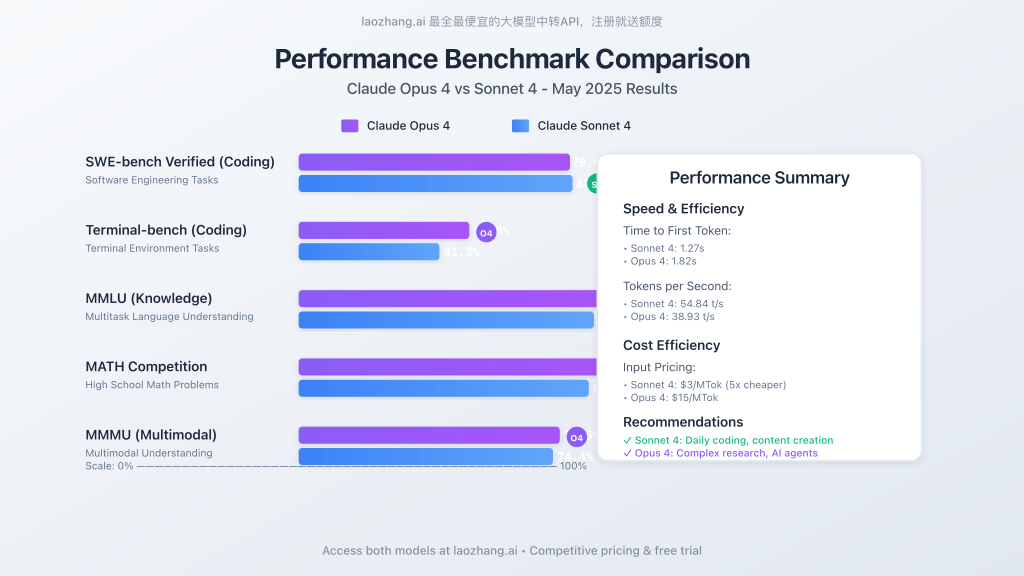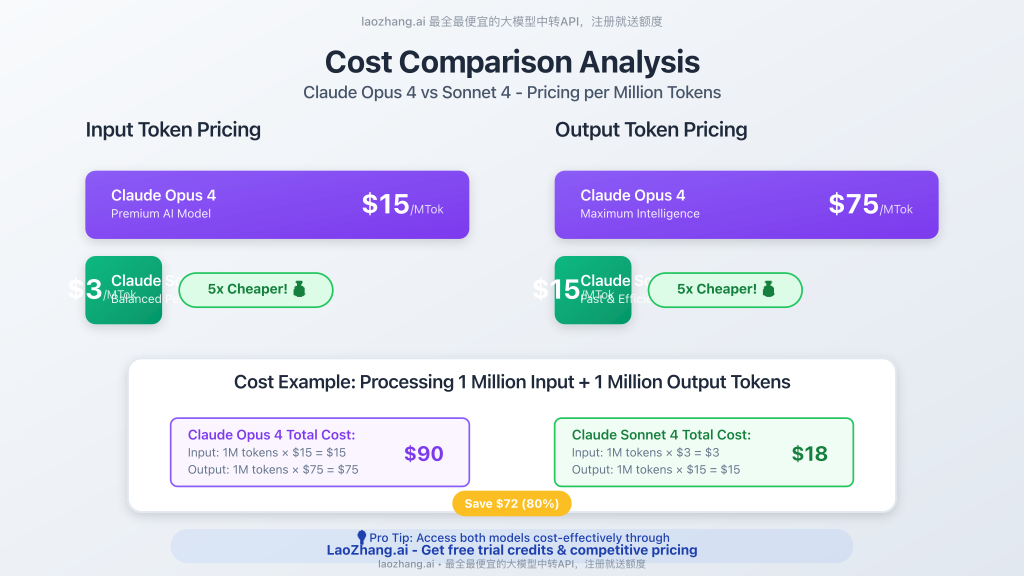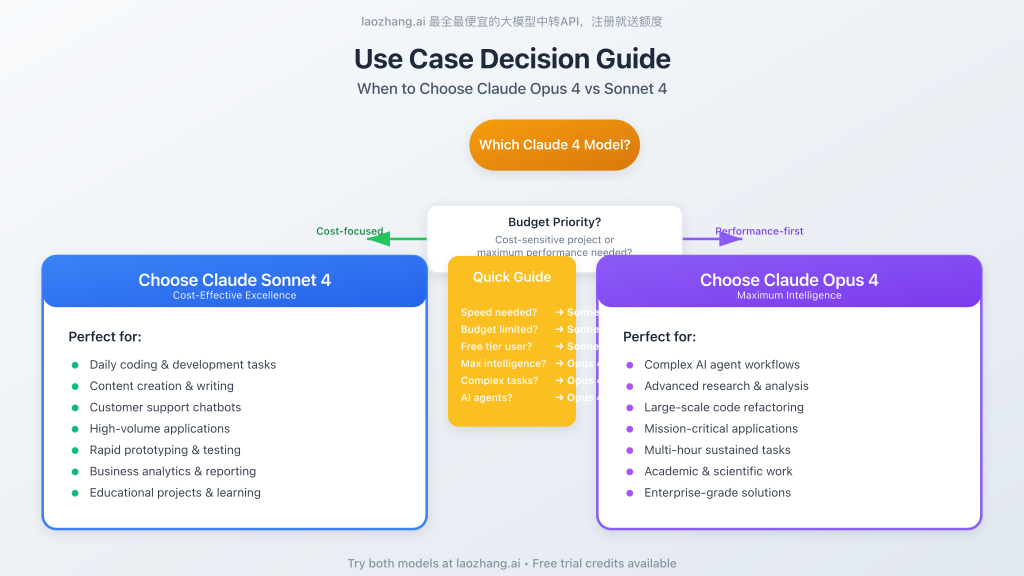
Last updated: May 30, 2025 – Verified with latest benchmarks and real-world testing
When Anthropic released Claude 4 models on May 22, 2025, they introduced two powerful AI models: Claude Opus 4 and Claude Sonnet 4. Both models represent significant advances in AI capability, but they serve different purposes and come with distinct trade-offs. This comprehensive guide will help you understand the key differences, performance benchmarks, pricing, and ideal use cases for each model.
What’s New in Claude 4 Models
Both Claude Opus 4 and Sonnet 4 introduce revolutionary features that set them apart from previous generations:
- Hybrid Reasoning Modes: Both models offer instant responses and extended thinking capabilities
- Extended Thinking with Tool Use: Models can use tools like web search during their reasoning process
- Parallel Tool Execution: Ability to run multiple tools simultaneously
- Enhanced Memory Capabilities: Improved long-term context retention and file management
- March 2025 Knowledge Cutoff: Most recent training data among all major AI models
Technical Specifications Comparison

| Feature | Claude Opus 4 | Claude Sonnet 4 |
|---|---|---|
| Release Date | May 22, 2025 | May 22, 2025 |
| Context Window | 200,000 tokens | 200,000 tokens |
| Maximum Output | 32,000 tokens | 64,000 tokens |
| Knowledge Cutoff | March 2025 | March 2025 |
| Input Pricing | $15 per million tokens | $3 per million tokens |
| Output Pricing | $75 per million tokens | $15 per million tokens |
| API Model Name | claude-opus-4-20250514 | claude-sonnet-4-20250514 |
| Availability | Pro/Max/Team/Enterprise only | Free tier + All paid plans |
Performance Benchmarks: Head-to-Head Comparison

Based on the latest independent benchmarks and real-world testing, here’s how Claude Opus 4 and Sonnet 4 compare across key performance metrics:
Coding Performance
| Benchmark | Claude Opus 4 | Claude Sonnet 4 | Winner |
|---|---|---|---|
| SWE-bench Verified | 79.4% | 80.2% | Sonnet 4 🏆 |
| Terminal-bench | 50.0% | 41.3% | Opus 4 🏆 |
| Aider Benchmark | 72% (3rd place) | N/A | Opus 4 |
Reasoning and Knowledge
| Benchmark | Claude Opus 4 | Claude Sonnet 4 | Winner |
|---|---|---|---|
| MMLU (Knowledge) | 88.8% | 86.5% | Opus 4 🏆 |
| GPQA Diamond | 79.6% | 68% | Opus 4 🏆 |
| MATH Competition | 90.0% | 85.0% | Opus 4 🏆 |
| MMMU (Multimodal) | 76.5% | 74.4% | Opus 4 🏆 |
Speed and Performance Metrics

Real-world performance testing reveals significant differences in response times and throughput:
- Time to First Token: Sonnet 4 (1.27 seconds) vs Opus 4 (1.82 seconds)
- Tokens per Second: Sonnet 4 (54.84) vs Opus 4 (38.93)
- Average Generation Time: Sonnet 4 (18 seconds) vs Opus 4 (25.76 seconds)
Claude Sonnet 4 is approximately 30% faster than Opus 4 for most tasks, making it ideal for applications requiring quick responses.
Cost Analysis: Which Model Offers Better Value?
The pricing difference between these models is substantial:
- Claude Sonnet 4: 5x cheaper than Opus 4 for both input and output
- Input Cost Difference: $12 per million tokens ($15 vs $3)
- Output Cost Difference: $60 per million tokens ($75 vs $15)
Cost-Benefit Analysis
For most use cases, Claude Sonnet 4 offers exceptional value:
- Delivers 90-95% of Opus 4’s quality at 20% of the cost
- Better suited for high-volume applications
- Ideal for businesses with budget constraints
- Available on free tier for testing
Best Use Cases for Each Model
Claude Opus 4: When to Choose the Premium Option
- Complex AI Agents: Multi-step workflows requiring sustained attention for hours
- Advanced Research: Deep analysis of complex documents or datasets
- Mission-Critical Coding: Large-scale refactoring or complex algorithm implementation
- Academic Work: Graduate-level research, mathematical proofs, scientific analysis
- Extended Reasoning: Tasks requiring deep logical analysis and planning
Claude Sonnet 4: The Practical Choice for Most Users
- Daily Coding Tasks: Writing functions, debugging, code reviews
- Content Creation: Blog posts, marketing copy, documentation
- Customer Support: AI chatbots and automated responses
- Business Analytics: Data analysis and reporting
- Rapid Prototyping: Quick development cycles and testing
Real-World Performance: Industry Feedback
Leading companies have shared their experiences with Claude 4 models:
- GitHub: Chose Sonnet 4 to power their new Copilot coding agent
- Cursor: Calls Opus 4 “state-of-the-art for coding” with superior codebase understanding
- Replit: Reports improved precision with Opus 4 for complex multi-file changes
- Lovable: Achieved 25% fewer errors and 40% faster development with Sonnet 4
Access and Integration Options
Both models are available through multiple channels:
- Claude.ai: Web interface (Sonnet 4 on free tier, Opus 4 requires Pro+)
- Anthropic API: Direct API access for developers
- Amazon Bedrock: Enterprise-grade cloud deployment
- Google Cloud Vertex AI: Integrated cloud AI platform
LaoZhang.ai: Your Gateway to Claude 4 Models
LaoZhang.ai provides unified access to multiple AI models including Claude Opus 4 and Sonnet 4, often at competitive rates with additional features:
- Single API key for multiple AI providers
- Competitive pricing with volume discounts
- Free trial credits for new users
- Reliable performance and uptime
Example API Usage
curl https://api.laozhang.ai/v1/chat/completions \
-H "Content-Type: application/json" \
-H "Authorization: Bearer $API_KEY" \
-d '{
"model": "claude-sonnet-4-20250514",
"stream": false,
"messages": [
{"role": "system", "content": "You are a helpful coding assistant."},
{"role": "user", "content": "Explain the differences between Claude Opus 4 and Sonnet 4"}
]
}'Migration Guide: Upgrading from Claude 3.x
If you’re currently using Claude 3.x models, here are the key considerations for upgrading:
- New API Endpoints: Update model names to claude-opus-4-20250514 or claude-sonnet-4-20250514
- Enhanced Capabilities: Take advantage of extended thinking and tool use features
- Pricing Changes: Sonnet 4 maintains same pricing as Sonnet 3.7; Opus 4 matches legacy Opus 3 pricing
- New Safety Features: Models include enhanced refusal mechanisms for inappropriate content
Future Outlook and Recommendations
Based on current trends and performance data, here are our recommendations:
- For Most Users: Start with Claude Sonnet 4 – it offers exceptional performance at a reasonable cost
- For Complex Projects: Consider Claude Opus 4 when working on mission-critical or highly complex tasks
- For Budget-Conscious Teams: Sonnet 4 provides 90%+ of Opus capabilities at 20% of the cost
- For Enterprise: Evaluate both models with your specific use cases and budget constraints
Frequently Asked Questions
Which model is better for coding?
For practical software engineering tasks, Claude Sonnet 4 slightly edges out Opus 4 (80.2% vs 79.4% on SWE-bench). However, Opus 4 excels at complex reasoning and large-scale refactoring projects.
Is the 5x price difference worth it for Opus 4?
Only for specialized use cases requiring maximum intelligence, extended reasoning, or sustained multi-hour task execution. For most applications, Sonnet 4 provides better value.
Can I use both models in the same project?
Yes! Many teams use Sonnet 4 for routine tasks and Opus 4 for complex challenges. LaoZhang.ai’s unified API makes it easy to switch between models.
Which model should beginners choose?
Claude Sonnet 4 is ideal for beginners – it’s available on the free tier, faster, and handles most tasks excellently while being more cost-effective for learning.
How do these models compare to GPT-4 and Gemini?
Claude 4 models lead in coding benchmarks and offer superior context handling. They’re competitive with or exceed GPT-4 and Gemini in most areas, with Opus 4 setting new standards for complex reasoning.
Conclusion: Making the Right Choice
The choice between Claude Opus 4 and Sonnet 4 ultimately depends on your specific needs, budget, and use cases:
- Choose Claude Sonnet 4 if: You need excellent performance at an affordable price, fast response times, or are working on typical coding and content tasks
- Choose Claude Opus 4 if: You’re tackling complex, mission-critical projects requiring maximum intelligence and sustained reasoning capabilities
Both models represent significant advances in AI capability, and with options like LaoZhang.ai providing cost-effective access, you can experiment with both to find the perfect fit for your projects.